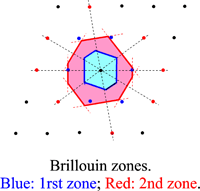Difference between revisions of "Brillouin zone"
From Online Dictionary of Crystallography
AndreAuthier (talk | contribs) |
AndreAuthier (talk | contribs) |
||
| Line 2: | Line 2: | ||
== Definition == | == Definition == | ||
| + | [[image:BRILLZ-1.gif|right]] | ||
Brillouin zones are used in band theory to represent in reciprocal space the solutions of the wave equations for the propagation of phonons or electrons in solids. The ''first'' Brillouin zone is the [[Wigner-Seitz cell]] of the reciprocal lattice. It is a polyhedron obtained by connecting a lattice point to its first neighbours and drawing the planes perpendicular to these connecting lines and passing through their midpoints. The second Brillouin zone is obtained by a similar construction but the second-nearest neighbours. | Brillouin zones are used in band theory to represent in reciprocal space the solutions of the wave equations for the propagation of phonons or electrons in solids. The ''first'' Brillouin zone is the [[Wigner-Seitz cell]] of the reciprocal lattice. It is a polyhedron obtained by connecting a lattice point to its first neighbours and drawing the planes perpendicular to these connecting lines and passing through their midpoints. The second Brillouin zone is obtained by a similar construction but the second-nearest neighbours. | ||
| + | |||
| + | The first Brillouin zone of a face-centered cubic lattice is a cubooctahedron. | ||
Revision as of 10:05, 22 February 2006
Zones de Brillouin (Fr).
Definition
Brillouin zones are used in band theory to represent in reciprocal space the solutions of the wave equations for the propagation of phonons or electrons in solids. The first Brillouin zone is the Wigner-Seitz cell of the reciprocal lattice. It is a polyhedron obtained by connecting a lattice point to its first neighbours and drawing the planes perpendicular to these connecting lines and passing through their midpoints. The second Brillouin zone is obtained by a similar construction but the second-nearest neighbours.
The first Brillouin zone of a face-centered cubic lattice is a cubooctahedron.
